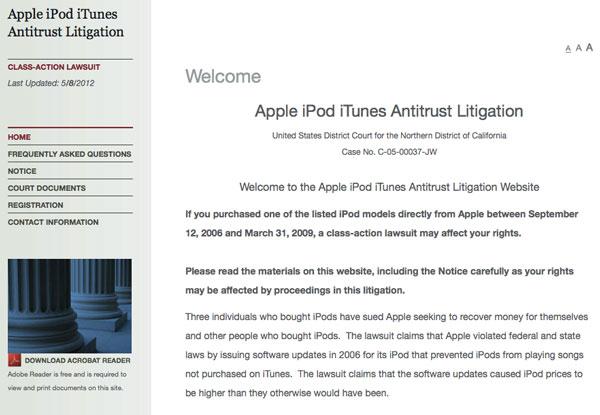iPod owners notified of class-action antitrust suit against Apple's iTunes
Last updated
Members of the class include customers who bought iPod classic, iPod shuffle, iPod touch and iPod nano models between Sept. 12, 2006 and March 31, 2009. No ruling has been made on the case and a settlement has not been reached, but e-mails began going out this week to inform iPod owners of the ongoing dispute, and refer them to ipodlawsuit.com for more information.
The complaint dates back to July 2004, when RealNetworks released a work-around dubbed "Harmony" that allowed songs purchased from its music store to be transferred onto the iPod. Apple released a statement accusing RealNetworks of adopting "the tactics and ethics of a hacker to break the iPod," and warning customers it was "highly likely" that Real's Harmony technology would not work with future version of the iPod software.
Later that year, Apple issued an update to its iPod software that disabled Harmony and prevented users from transferring songs from the service. RealNetworks admitted to investors in 2005 that the Harmony technology had put the company at risk to a lawsuit from Apple.
Then, in early 2005, Thomas Slattery filed a class-action lawsuit against Apple, alleging that the company had violated federal antitrust laws and california's unfair competition law by requiring that customers use an iPod to listen to music purchased via the iTunes Music Store.
The complaint has dragged on for more than 7 years now, and last year Magistrate Judge Howard R. Lloyd in San Jose, Calif., even authorized limited questioning of Apple's then-chief-executive Steve Jobs. In the 7 years since the suit was filed, Apple has negotiated with music labels for a more open iTunes Music Store, and songs sold there are now provided without digital rights management software, which restricts how files can be used.
Early this month, a pair of settlement conferences were held in the class-action suit, known as "The Apple iPod iTunes Anti-Trust Litigation." However, no settlement could be reached during those discussions.
The court then held a case management conference on May 2, in which the case and any disputes until Aug. 31, 2012, are referred to Magistrate Judge Joseph C. Spero.
Judge James Ware also declared that Apple has a right to file a motion for summary judgment to address issues which have not yet been raised before the court. Both Apple and the plaintiff have admitted to the court that an "outstanding expert" report has not yet been served by the plaintiffs.
"in light of this, the Court finds no reason to deny the Defendant the ability to challenge that expert report once it becomes available, and to file any appropriate motion for summary judgment resulting from disclosures made in that expert report," Judge Ware wrote. "Accordingly, on or before May 20, 2012, the parties shall meet and confer and stipulate to a suitable schedule with respect to any further disruptive motions that any party may seek to file."
As for those who have been notified that they are a class member, customers have the right to do nothing and remain a part of the class, or they can ask to be excluded to get out of the lawsuit and receive no benefits from it. Those who wish to be excluded must send an "Exclusion Request," as detailed on the lawsuit's official website.
 Neil Hughes
Neil Hughes














 Amber Neely
Amber Neely
 Thomas Sibilly
Thomas Sibilly
 AppleInsider Staff
AppleInsider Staff
 William Gallagher
William Gallagher
 Malcolm Owen
Malcolm Owen
 Christine McKee
Christine McKee










70 Comments
Is it just me thinking it's a bit retarded?
Awesome? What exactly do they hope to win here?
Awesome? What exactly do they hope to win here?
Very good question...what is the point of this?
I thought nothing could be dumber than the fiasco of patent lawsuits...I was wrong.
[quote name="macxpress" url="/t/149956/ipod-owners-notified-of-class-action-antitrust-suit-against-apples-itunes#post_2107201"] Very good question...what is the point of this? [/quote] Nothing more than lawyers being lawyers. Since unemployment is so high I bet worker's comp claims are also down. Gotta collect a paycheck for something...